Five USB 3.0 Flash Drives For Your Pocket
Do you carry around large amounts of data? Do you need to transfer it between devices in a hurry? We're examining five new USB 3.0-based portable storage solutions that might fit your needs. This time around, the focus is on maximizing portability.
Super Talent’s Express Drive And SuperCrypt Pro
Express Drive
Super Talent’s most-compact USB 3.0 flash drive isn’t available at capacities larger than the 32 GB sample we received, and it might have otherwise gone overlooked if it weren't for the fact that several of its competitors were also unable to provide samples at the requested 128 GB capacity.
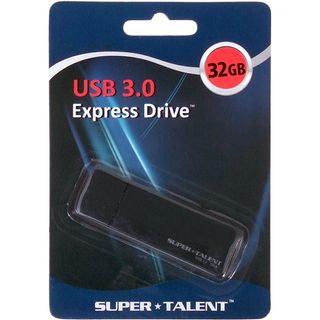
The USB 3.0 Express Drive has a couple advantages over its higher-capacity competitors in pocketability, having the smallest format and fitting a system without the need for a cable.


However, an extension cable might have been handy, since this 1”-wide drive exceeds the port spacing of most motherboard connectors. That is to say, connecting it to a motherboard often requires unplugging the cables in adjacent connectors.
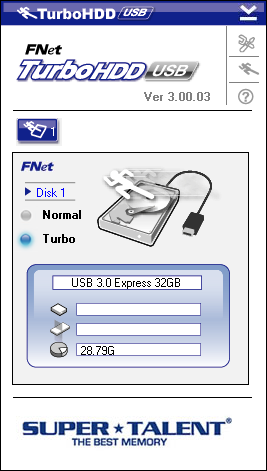
The USB 3.0 Express Drive is loaded with FNet TurboHDD software on a separate 6 MB partition that’s been configured to appear as a USB CD-ROM. Inserting the drive causes TurboHDD to run automatically in Windows, unless the OS is configured not to do so. We tested the USB 3.0 Express Drive in both normal mode and turbo mode.
SuperCrypt Pro
Available at capacities of up to 256 GB, Super Talent sent the 32 GB Pro version of its enormous SuperCrypt USB 3.0 device.
Stay on the Cutting Edge
Join the experts who read Tom's Hardware for the inside track on enthusiast PC tech news — and have for over 25 years. We'll send breaking news and in-depth reviews of CPUs, GPUs, AI, maker hardware and more straight to your inbox.
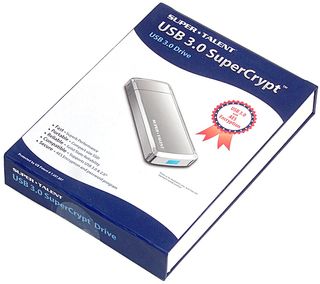
Based on the design of its famous RAIDDrive, additional controller hardware surely accounts for some of the drive’s bulk.
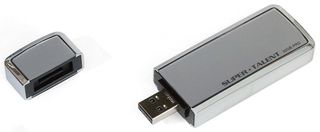
Criticism of the drive’s 3.8” x 1.4” x 0.6” dimensions might sound unfair given that it competes against larger pocket drives, but those parts are not supposed to be thumb drives. Super Talent puts its Type A plug on the body of this one and doesn’t include a short extension cable to move it out of the way of a PC’s nearby connectors.
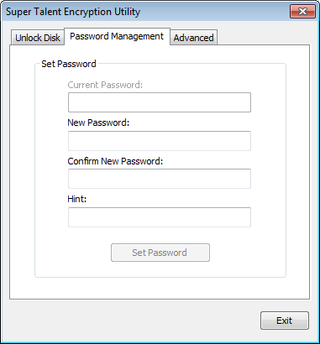
The Pro version of Super Talent’s SuperCrypt provides 256-bit AES encryption, while the "non-pro" version is limited to 128-bit encryption. The user interface launches from a separate, protected 32 MB partition that reduces the drive's total capacity by the same amount. Super Talent also includes a link to its download page where one can find an enhanced driver to boost the drive’s transfer performance. Knowing that many buyers will use the drive across multiple systems, we tested the SuperCrypt USB 3.0 using both the default Windows driver and Super Talent’s enhanced driver.
Current page: Super Talent’s Express Drive And SuperCrypt Pro
Prev Page Power Quotient International (PQI) SSD S533-E Next Page Test System Configuration-
rohitbaran ReplyThe heavy-duty gaming hardware used for today’s test is coincidental, as it was already set up on the bench for an upcoming graphics test. It includes Gigabyte’s high-flying X58A-UD9 motherboard.
Which is the mystery card? -
rohitbaran BTW, I liked Super Talent Super crypt, despite being slower than OCZ and PQI, it is the size I would be comfortable carrying in my pocket.Reply -
huron I know these technologies are more toward the "bleeding edge," but it's nice to know that manufacturers see it as enough of a market to start making products. Maybe USB 3.0 will make it mainstream relatively soon.Reply -
Would you be able to use the 128GB as a boot drive for win7 and how would they fall in price/performance between sata ssd and a VelociRaptor?Reply
-
liquidsnake718 can you play a game like crysis or even warcraft 2 well straight out of this ssd with a no cd crack?Reply -
irh_1974 reclusiveorcWould you be able to use the 128GB as a boot drive for win7 and how would they fall in price/performance between sata ssd and a VelociRaptor?I have been saying this to people for years, that one day you will have your whole PC installation on a flash drive. Just plug into a PC, boot from the flash drive and everything is there.Reply -
bCubed Too bad it will still be some time before usb 3.0 will become mainstream and even longer for extremely good drives to come outReply
Most Popular


